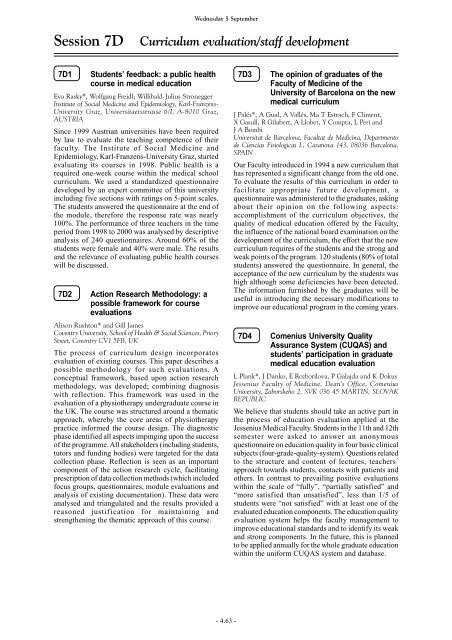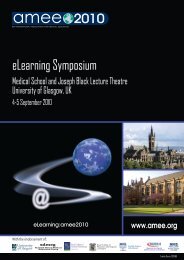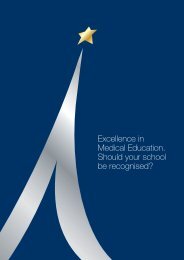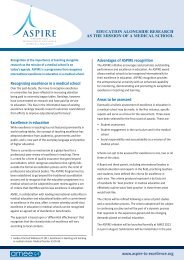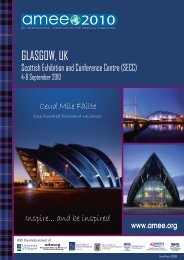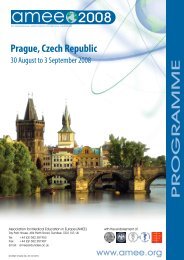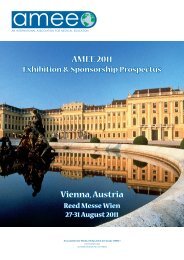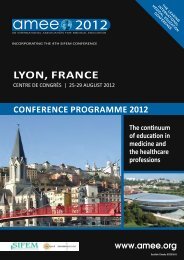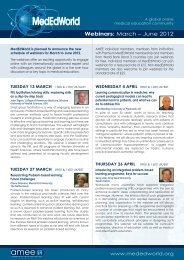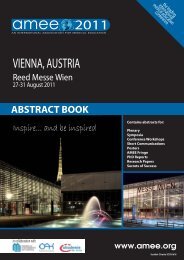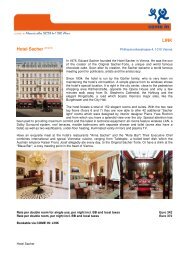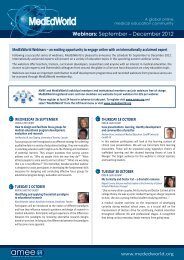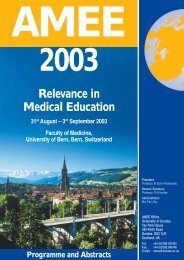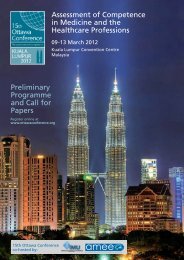AMEE Berlin 2002 Programme
AMEE Berlin 2002 Programme
AMEE Berlin 2002 Programme
You also want an ePaper? Increase the reach of your titles
YUMPU automatically turns print PDFs into web optimized ePapers that Google loves.
Session 7D Curriculum evaluation/staff development<br />
7D1 Students’ feedback: a public health<br />
course in medical education<br />
Eva Rasky*, Wolfgang Freidl; Willibald-Julius Stronegger<br />
Institute of Social Medicine and Epidemiology, Karl-Franzens-<br />
University Graz, Universitaetsstrasse 6/I, A-8010 Graz,<br />
AUSTRIA<br />
Since 1999 Austrian universities have been required<br />
by law to evaluate the teaching competence of their<br />
faculty. The Institute of Social Medicine and<br />
Epidemiology, Karl-Franzens-University Graz, started<br />
evaluating its courses in 1998. Public health is a<br />
required one-week course within the medical school<br />
curriculum. We used a standardized questionnaire<br />
developed by an expert committee of this university<br />
including five sections with ratings on 5-point scales.<br />
The students answered the questionnaire at the end of<br />
the module, therefore the response rate was nearly<br />
100%. The performance of three teachers in the time<br />
period from 1998 to 2000 was analysed by descriptive<br />
analysis of 240 questionnaires. Around 60% of the<br />
students were female and 40% were male. The results<br />
and the relevance of evaluating public health courses<br />
will be discussed.<br />
7D2 Action Research Methodology: a<br />
possible framework for course<br />
evaluations<br />
Alison Rushton* and Gill James<br />
Coventry University, School of Health & Social Sciences, Priory<br />
Street, Coventry CV1 5FB, UK<br />
The process of curriculum design incorporates<br />
evaluation of existing courses. This paper describes a<br />
possible methodology for such evaluations. A<br />
conceptual framework, based upon action research<br />
methodology, was developed; combining diagnosis<br />
with reflection. This framework was used in the<br />
evaluation of a physiotherapy undergraduate course in<br />
the UK. The course was structured around a thematic<br />
approach, whereby the core areas of physiotherapy<br />
practice informed the course design. The diagnostic<br />
phase identified all aspects impinging upon the success<br />
of the programme. All stakeholders (including students,<br />
tutors and funding bodies) were targeted for the data<br />
collection phase. Reflection is seen as an important<br />
component of the action research cycle, facilitating<br />
prescription of data collection methods (which included<br />
focus groups, questionnaires, module evaluations and<br />
analysis of existing documentation). These data were<br />
analysed and triangulated and the results provided a<br />
reasoned justification for maintaining and<br />
strengthening the thematic approach of this course.<br />
Wednesday 5 September<br />
- 4.63 -<br />
7D3 The opinion of graduates of the<br />
Faculty of Medicine of the<br />
University of Barcelona on the new<br />
medical curriculum<br />
J Palés*, A Gual, A Vallés, Ma T Estrach, F Climent,<br />
X Gasull, R Gilabert, A Llobet, Y Compta, L Peri and<br />
J A Bombi<br />
Universitat de Barcelona, Facultat de Medicina, Departmento<br />
de Ciencias Fisiologicas I., Casanova 143, 08036 Barcelona,<br />
SPAIN<br />
Our Faculty introduced in 1994 a new curriculum that<br />
has represented a significant change from the old one.<br />
To evaluate the results of this curriculum in order to<br />
facilitate appropriate future development, a<br />
questionnaire was administered to the graduates, asking<br />
about their opinion on the following aspects:<br />
accomplishment of the curriculum objectives, the<br />
quality of medical education offered by the Faculty,<br />
the influence of the national board examination on the<br />
development of the curriculum, the effort that the new<br />
curriculum requires of the students and the strong and<br />
weak points of the program. 120 students (80% of total<br />
students) answered the questionnaire. In general, the<br />
acceptance of the new curriculum by the students was<br />
high although some deficiencies have been detected.<br />
The information furnished by the graduates will be<br />
useful in introducing the necessary modifications to<br />
improve our educational program in the coming years.<br />
7D4 Comenius University Quality<br />
Assurance System (CUQAS) and<br />
students’ participation in graduate<br />
medical education evaluation<br />
L Plank*, J Danko, E Rozborilova, P Galajda and K Dokus<br />
Jessenius Faculty of Medicine, Dean’s Office, Comenius<br />
University, Zaborskeho 2, SVK 036 45 MARTIN, SLOVAK<br />
REPUBLIC<br />
We believe that students should take an active part in<br />
the process of education evaluation applied at the<br />
Jessenius Medical Faculty. Students in the 11th and 12th<br />
semester were asked to answer an anonymous<br />
questionnaire on education quality in four basic clinical<br />
subjects (four-grade-quality-system). Questions related<br />
to the structure and content of lectures, teachers´<br />
approach towards students, contacts with patients and<br />
others. In contrast to prevailing positive evaluations<br />
within the scale of “fully”, “partially satisfied” and<br />
“more satisfied than unsatisfied”, less than 1/5 of<br />
students were “not satisfied” with at least one of the<br />
evaluated education components. The education quality<br />
evaluation system helps the faculty management to<br />
improve educational standards and to identify its weak<br />
and strong components. In the future, this is planned<br />
to be applied annually for the whole graduate education<br />
within the uniform CUQAS system and database.


